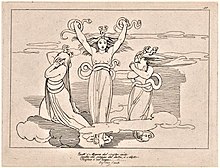Megera
Megaera
One of the Erinyes or Furies in Ancient Greek mythology
Megaera (/məˈdʒɪərə/ mə-JEER-ə; Ancient Greek: Μέγαιρα, romanized: Mégaira, lit. 'the jealous one'[1]) is one of the Erinyes, Eumenides or "Furies" in Greek mythology. Bibliotheca Classica states "According to the most received opinions, they were three in number, Tisiphone, "Megaera ... daughter of Nyx and Acheron",[2] and Alecto".[3]
This article needs additional citations for verification. (October 2015) |
In other versions, she and her sisters, as well as the Meliae, were born of the blood of Uranus when Cronus castrated him.[4]
In modern French (mégère), Portuguese (megera), Modern Greek (μέγαιρα), Italian (megera), Polish (megiera), Russian (мегера), Ukrainian (меґера) and Czech (megera), this name denotes a jealous or spiteful woman. She is not to be confused with Megara, the wife of Heracles.
